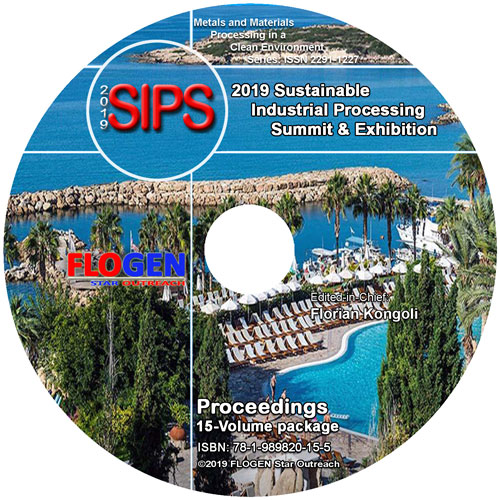2019-Sustainable Industrial Processing Summit
SIPS2019 Volume 12: Energy Production and Secondary Batterie
| Editors: | F. Kongoli, H. Dodds, M. Mauntz, T. Turna, K. Aifantis, A. Fox, V. Kumar |
| Publisher: | Flogen Star OUTREACH |
| Publication Year: | 2019 |
| Pages: | 112 pages |
| ISBN: | 978-1-989820-11-7 |
| ISSN: | 2291-1227 (Metals and Materials Processing in a Clean Environment Series) |

CD shopping page
Overview on Lithium Sulphur Batteries Technologies
Claudio Capiglia1;1RECRUIT R&D, Tokyo, Japan;
Type of Paper: Keynote
Id Paper: 15
Topic: 14
Abstract:
Li-ion technology might have reached its limit especially when it comes to the energy requirements for the next generation of electric vehicles (EVs) and hybrid electric vehicles (HEVs). Lithium-sulphur batteries could represent a good alternative because they have higher theoretical energy than conventional lithium-ion batteries and are a good candidate for application in the growing e-mobility and stationary market.
There are, however, technical issues which should be properly addressed, such as the low conductivity and the large volume variation of sulphur, as well as the formation of polysulphides during cycling, especially, the back and forth movement of polysulphides between cathode and anode, known as the shuttle effect.
In this presentation, a systematic description of the approach which aims at mitigating these issues is overviewed and the electrochemical performances associated with the different proposed solutions are discussed. To better understand the failure mechanisms of lithium-sulphur batteries, important novel characterization techniques applied to energy storage systems are also reviewed. Finally, the state of the art of lithium-sulphur batteries technology is presented from a geopolitical perspective by providing a comparison between the results achieved in this field by the main world industrial and academic actors, namely Asia, North America, and Europe [1,2]
Keywords:
Energy; Li-S; Mechanics; SecondaryBattery; Technology;References:
[1] A comprehensive understanding of lithium-sulphur battery technology" C. Capiglia et al. Journal Advanced Functional Materials. Submitted.[2] Comprehensive understanding lithium-sulphur batteries: current status and outlooks, Advanced Battery Materials, Capiglia et al., 355-398, Chunwen Sun (ed.), 2019 WILEY-Scrivener Publishing LLC, USA.